Politics
Trump touts renewed peace talks in Ukraine, makes claims on Greenland
Published
2 months agoon
By
Ekwutos Blog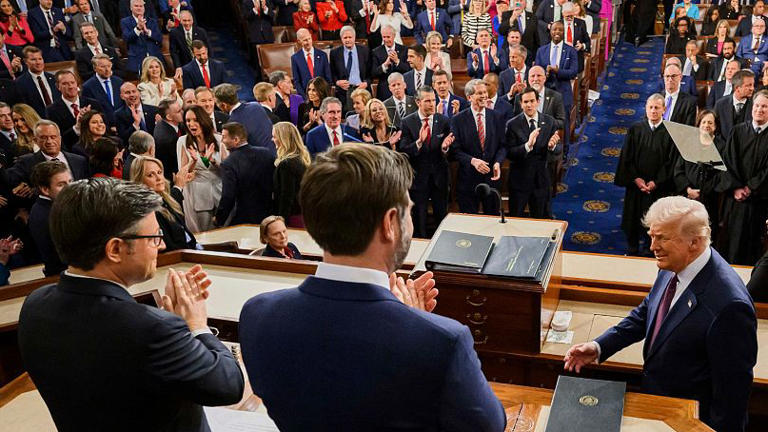
Trump delivered his first joint address to Congress on Tuesday since his return to power, addressing Ukraine and Greenland in a record 99 minute speech.
He wasted no time in outlining his administration’s achievements, emphasising what he believes to be an unparalleled level of success in a remarkably short period.
“America’s momentum, spirit, pride, and confidence are back,” Trump declared. “The American dream is surging bigger and better than ever before. It is unstoppable, and our country is on the verge of a comeback the likes of which the world has never witnessed.”
The president also reflected on the speed and scale of his accomplishments, stating that his administration had achieved more in just 43 days than most past administrations had in four or even eight years.
“This has been nothing but swift and unrelenting action,” Trump said, underscoring his commitment to delivering results for the American people.
Trump’s address covered a wide range of issues, from international relations to domestic policy. His comments ranged from discussions of Ukraine’s push for peace talks to new tariff proposals and his vision for the US economy.
Here’s a look at some of the key points he made during his remarks.
Ukraine: Renewed peace talks?
One of the most significant moments in Trump’s speech came when he recited a letter he had received from Ukrainian President Volodymyr Zelenskyy on Tuesday.
According to Trump, Zelenskyy expressed a desire to return to the negotiating table after a previously contentious Oval Office meeting that had broken down peace talks between Russia and Ukraine.
He quoted part of the letter, which read, “My team and I stand ready to work under President Trump’s strong leadership to achieve a lasting peace.”
Zelenskyy also acknowledged America’s support for Ukraine, stating, “We do really value how much America has done to help Ukraine maintain its sovereignty and independence. Regarding the agreement on minerals and security, Ukraine is ready to sign it at any time that is convenient for you.”
Trump mentioned that he and Zelenskyy were initially set to sign a minerals deal at the White House on Friday, but the meeting ended in a heated exchange, leading to Zelenskyy being asked to leave.
Trump expressed appreciation for the letter and noted that, “simultaneously, we’ve had serious discussions with Russia and have received strong signals that they are ready for peace.”
Trump followed up by adding, “Wouldn’t that be beautiful?”, expressing optimism about the possibility of a peace deal and highlighting that both sides might be closer than ever to resolving the conflict, despite the failure of previous talks.
Tariffs: A sharp critique of global trade practices
In a marked shift to domestic policy, Trump sharply criticised several nations for what he described as “unfair” trade practices against the US.
He specifically pointed to the European Union, India, Mexico, and Brazil, noting that these countries – and “many others” – had imposed trade policies that disadvantaged American interests.
He declared, “This is happening by both friends and foes,” referring to both allies and adversaries that impose high tariffs on American goods.
Trump announced that starting on 2 April, the US would impose “reciprocal tariffs,” meaning that the US would impose the same tariffs on countries that levy taxes on American products.
“Whatever they tax us, we will tax them,” he said, explaining how the new tariff system would work. Historically, Trump argued, the US has imposed lower tariffs than many of its trading partners, and now it was time to reverse that trend.
This week, the Trump administration imposed significant tariffs on Mexico and Canada. In response, both nations announced retaliatory tariffs, raising concerns that this could spark a full-fledged trade war.
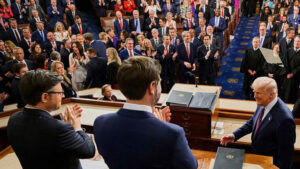
President Donald Trump is applauded as he arrives to address a joint session of Congress at the Capitol in Washington. Mandel Ngan/Pool Photo via AP
Economists have warned that such a conflict could drive up consumer prices, but Trump remained steadfast in his position that the US had been unfairly treated by foreign trade partners for years.
“We will take in trillions and trillions of dollars and create jobs like we have never seen before,” Trump said with confidence, signalling that his administration’s tough stance on tariffs would significantly boost the US economy and manufacturing sector.
In particular, he pointed to the US auto industry, which he claimed was “absolutely booming” thanks to a combination of tariffs and his victory in the 2016 election.
He acknowledged that tariffs would create some “disturbance,” but assured that the country would be “OK with that.”
Trump praised Mexico for its recent efforts to extradite cartel leaders to the US, but he pushed for more action, specifically to combat fentanyl trafficking.
“But we need more from Mexico and Canada to stop fentanyl from crossing the border,” he said, calling on Congress to pass a bill that would enhance border security and reduce drug trafficking.
Additionally, Trump reiterated his stance on immigration, stating that his administration had already submitted a detailed funding request to Congress aimed at “carrying out the largest deportation operation in US history.”
The economy: ‘Rescue’ and relief for working families
Trump also addressed the state of the US economy, claiming that one of his top priorities was to “rescue our economy” and provide “relief” for American families.
He blamed the previous administration for the economic challenges he inherited, describing it as an “economic catastrophe and an inflation nightmare.”
Trump made it clear that he believed the current economic woes were a direct result of policies enacted under President Joe Biden’s leadership.
“I’m fighting every day to make America affordable again,” Trump said, pledging to reverse the economic downturn and reduce costs for working-class families.
He criticised Biden for the sharp rise in prices for goods like eggs, calling it an example of “out of control” inflation. He promised to address these issues head-on, aiming to make life more affordable for American families struggling with rising costs.
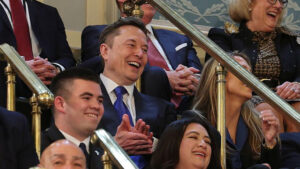
Elon Musk claps as President Donald Trump addresses a joint session of Congress at the Capitol. Win McNamee/Pool Photo via AP
Greenland: ‘I think we’re going to get it’
Trump revisited his controversial interest in acquiring Greenland, a proposal that first gained attention during his first term.
Although Greenland is a semiautonomous territory of Denmark, Trump suggested that the US would “welcome” the island into its fold for national security reasons.
“I think we’re going to get it,” Trump said of Greenland, indicating that he believed the US would ultimately obtain control of the territory “one way or another.”
The acquisition of Greenland, which is home to a large US military base, has been a long-standing goal for Trump. He framed it as an opportunity to strengthen US national security while also bringing economic prosperity to the country.
“It would make them rich, and it would make us safe,” Trump added.
Trump also expressed his desire to “reclaim” the Panama Canal, a remark that seemed to be both an ambitious foreign policy goal and a veiled jab at his Secretary of State, Marco Rubio, who has faced criticism for his handling of US foreign policy.
Law and order: Aggressive policing
Trump’s speech also touched on issues related to law enforcement and public safety, continuing his campaign rhetoric surrounding “law and order.”
He called for a return to stronger law enforcement in US cities, claiming that “our justice system has been turned upside down by Radical Left lunatics.”
Trump painted a picture of Democratic-led cities as overrun with crime, despite evidence suggesting a broader decline in violent crime rates since the height of the COVID-19 pandemic.
In his remarks, Trump advocated for more aggressive policing, suggesting that “one rough hour” of law enforcement action would be enough to put an end to retail theft and other crimes.
He also pushed for greater protection for police officers, including “immunity from prosecution” for those involved in law enforcement actions.
Disruption in the chamber and protests nationwide
Trump’s address was not without controversy.
During his speech, Democratic Representative Al Green shouted, “You have no mandate,” challenging the legitimacy of Trump’s policies and leadership.
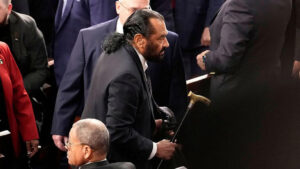
Democratic representative Al Green is escorted from the Chamber after heckling the President. AP Photo/Ben Curtis
Green was promptly escorted out of the chamber, buy other protests were visible in the audience, where small signs reading “Protect Veterans,” “Save Medicaid,” and “False” were raised in protest.
Protests were also held across the United States as Trump made his address, with pro-Ukraine demonstrators gathering outside the US Capitol and large crowds rallying against the President and his agenda outside the Fox News Headquarters in New York.

You may like


APC CANDIDATES FOR 2025 NIGER STATE LOCAL GOVERNMENT COUNCIL ELECTION
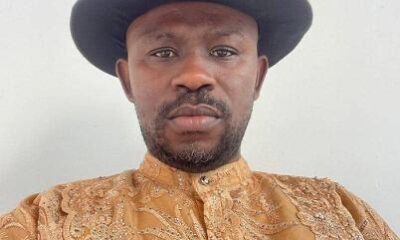

Kyari brought structure, stability to NNPCL – NDYC
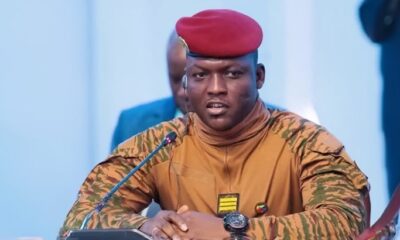

ANALYSIS: With Traore, Burkina Faso can get governance right, achieve developmental aspirations
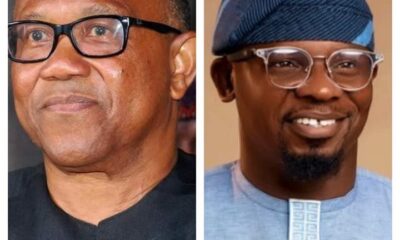

PETER OBI WILL WIN 2027 ELECTION EFFORTLESSLY—- Ife Salako(Labour party spokesperson Lagos state)
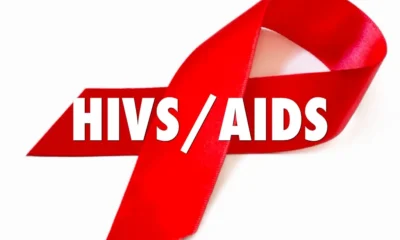

Ogun unveils new strategy to fight HIV/AIDS
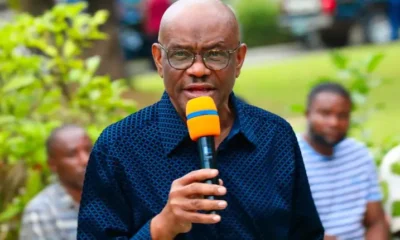

Wike applauds Okowa, Oborevwori for supporting President Tinubu
Politics
APC CANDIDATES FOR 2025 NIGER STATE LOCAL GOVERNMENT COUNCIL ELECTION
Published
28 minutes agoon
April 24, 2025By
Ekwutos Blog
1. Hon. Sayuti Ibrahim Halilu – Again
2. Hon. Iliyasu Zakari – Agwara
3. Hon. Usman Manko Mohammed – Bida
4. Hon. Abdullahi Mohammed Nasiru – Borgu
5. Hon. Abdullahi Usman Laka – Bosso
6. Hon Mustapha Mohammed Jibril – Chanchaga
7. Hon. Usman Ndana – Edati
8. Hon. Hassan Mohammed – Gbako
9. Hon. Jonah Ishaya – GURARA
10. Hon. Isah Baba Bida – Katcha
11. Hon. Lawal Yusuf – Kontagora
12. Hon. Abdullahi Umar Evuti – Lapai
13. Hon. Mohammed Alfa Ma’ali – Lavun
14. Hon. Mamuda Mamman – Magama
15. Hon Aliyu Baga Mohammed – Mariga
16. Hon. Umar Jibril Igade – Mashegu
17. Hon. Jibril Abdullahi Muregi – Mokwa
18. Hon. Aminu A. Najume – Munya
19. Hon. Aminu Umar Yandayi – Paikoro
20. Hon. Ayuba Usman Katako – Rafi
21. Hon Abdullahi Yakubu Dukku – Rijau
22. Hon. Isyaku Bawa – Shiroro
23. Hon Isyaku Bawa Naibi – Suleja
24. Hon. Danladi T. Ijah – Tafa
25. Hon Mohammed Ibrahim Lokogoma – Wushishi
Politics
ANALYSIS: With Traore, Burkina Faso can get governance right, achieve developmental aspirations
Published
50 minutes agoon
April 24, 2025By
Ekwutos Blog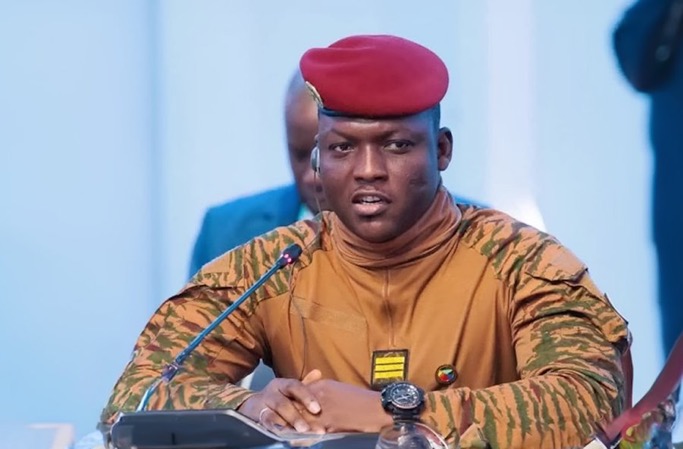
The challenge will be translating Burkina Faso’s rich mineral resources and promising economy into stability and development.
At 36, Burkina Faso’s Ibrahim Traoré is the world’s youngest president, in stark contrast to Africa’s average leader age of 63. He took office in September 2022 after overthrowing Paul-Henri Damiba, who had ousted former president Roch Kaboré earlier that year.
The foundations of the country’s coup administration have been rocky. Last week, the military government survived another apparent coup attempt; one among several since Mr Traoré, an army captain, came to power.
In his inaugural statement, Mr Traoré said Burkina Faso faced an emergency, citing crises in security, defence, healthcare, social action and infrastructure. He pledged to combat terrorism and adhere to the transition timetable agreed with the Economic Community of West African States (ECOWAS), which aimed to restore democratic rule by 1 July 2024.
However, Burkina Faso has since withdrawn from ECOWAS, forming instead the Alliance of Sahel States with Mali and Niger – countries also run by post-coup administrations. Under Burkina Faso’s new transition plan, Mr Traoré may remain in his position until at least 2029.
His popularity has soared since his ascension to power. At President John Mahama’s inauguration in Ghana on 7 January, Mr Traoré received the loudest applause of all 21 African heads of state. This showed not only his popularity but the trend of tolerance for military rule in Africa, especially among the youth.
Afrobarometer reports that almost two-thirds of Burkinabé believe the army should intervene when leaders abuse their power. Likewise, 66 per cent accept military rule, up from 24 per cent in 2012. The fact that the survey was conducted at a time when the country was under military rule portrays a general acceptance of the regime.
However, Mr Traoré’s popularity goes beyond acceptance of military rule. He has embarked on radical reforms that resonate with many Burkinabé. These include reversing his predecessor’s salary increase for government officials while he remainson his military captain earnings.
As part of efforts to take ownership of mineral resources, Mr Traoré has nationalised two gold mines and stopped exporting unrefined gold to Europe, instead inaugurating a national gold refinery expected to process 150 tonnes annually.
Other significant achievements include establishing the National Support Center for Artisanal Cotton Processing, building a new airport, and considerable agricultural investment.
While these are noble attempts to industrialise Burkina Faso, the country must not fall into the usual traps of inefficiencies, corruption and mismanagement that characterise most African state-owned enterprises.
Further, Mr Traoré has rejected financial assistance from the International Monetary Fund and World Bank, insisting the country can develop without the West’s loans and conditionalities. For some, this is a demonstration of Africans handling their own affairs. For the youth, Mr Traoré’s regime is a chance to show what young people can achieve. But for most ordinary Burkinabé, the priority is simply improving their daily living conditions.
At a time of increasing global uncertainty and a decline in international aid, Africa must strive for self-reliance and control of its resources. Like many African countries, Burkina Faso is blessed with natural resources that, if properly managed, could transform citizens’ lives.
The country has mineral resources and produces substantial quantities of gold, zinc, copper, manganese, phosphate and limestone. It also has reserves of diamonds, bauxite, nickel and vanadium, most of which remain largely unexploited.
The country has made gains. Gross Domestic Product (GDP) (in market exchange rate) increased from $3.2 billion in 1990 to $18.3 billion in 2023, and extreme poverty declined from 83 per cent to 27.7 per cent in the same period. But significant challenges remain.
According to the 2023/2024 Human Development Report, Burkina Faso is classified as having low human development and is ranked 185th out of 193 countries on the Human Development Index. Itplaced 149th out of 167 countries on the 2024 Sustainable Development Goals Index, and on the Multidimensional Poverty Index, 64.5 per cent of the population is multidimensionally poor.
However, the economy holds significant promise. Recent research by the Institute for Security Studies’ African Futures and Innovation team shows that Burkina Faso’s economy could grow at an average rate of 8 per cent from 2025 to 2043.
This would translate into an additional GDP per capita of $1,120 above a business-as-usual forecast – and reduce income poverty to only 2.6 per cent of the population. This means an extra 2.4 million Burkinabés could be lifted out of poverty by 2043.
The study identified governance reforms as critical to unlocking the country’s development potential. Indeed, good governance could raise GDP per capita by an extra $240 above a business-as-usual forecast, lifting 500,000 additional Burkinabé out of extreme poverty.
For this, Mr Traoré must lead the country in overcoming political instability, violent extremism and weak institutions. Institutional and structural reforms are needed to enhance security, accountability, public sector efficiency and governance inclusion.
The immediate priority is addressing terrorism, which resulted in the loss of about 40 per cent of the country’s territory, undermining the state’s authority and ability to deliver public services, as thousands of schools and health facilities are closed in those areas. The UN Refugee Agency estimates that over two million people are internally displaced, and those needing humanitarian assistance increased by 35 per cent between 2022 and 2023.
Next should be building strong institutions and strengthening existing ones to improve public sector efficiency and combat corruption. Local governments must be empowered with the resources and capacity to implement development programmes tailored to communities’ needs.
In the medium term, the country must transition into constitutional rule to ensure the political stability and legitimacy needed to drive economic growth. This would also enhance investor confidence, allowing Burkina Faso to attract the foreign direct investment needed for its development. The African Union, civil society organisations and development partners should support the 60-month transition plan to ensure a smooth transition to democracy.
This is not the first time such a charismatic figure has emerged on Africa’s political scene. Many revolutionary leaders started the same way but later deviated from the course as they clung to power. In Ghana, 32-year-old Jerry Rawlings, nicknamed ‘Junior Jesus’, emerged in late 1979 in a bloody revolution to fight corruption and sanitise the country’s political system. But after 19 years in power, his legacy was mixed.
With a young, strong, charismatic leader, Burkina Faso has a chance to get its governance right and achieve its developmental aspirations. This could be a lasting legacy for Traoré’s regime.
Enoch Randy Aikins, Researcher, African Futures and Innovation, Institute for Security Studies (ISS)
(This article was first published by ISS Today, a Premium Times syndication partner. We have their permission to republish).
Politics
PETER OBI WILL WIN 2027 ELECTION EFFORTLESSLY—- Ife Salako(Labour party spokesperson Lagos state)
Published
56 minutes agoon
April 24, 2025By
Ekwutos Blog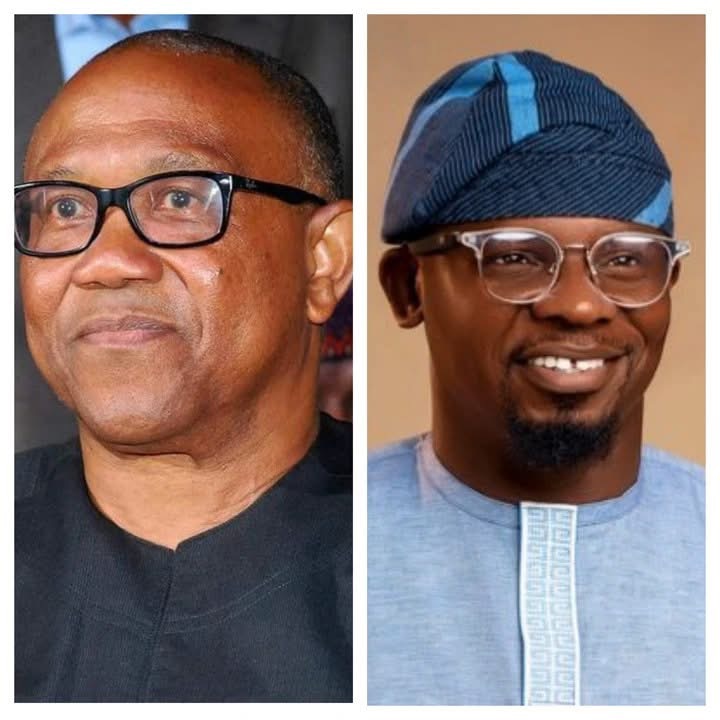
the labour party spokesperson, Lagos state chapter, Mr Ife Salako has affirmed that Peter Obi may not need the help of any governor to win the 2027 general election. Speaking about the recent decamp of some PDP politicians to APC, include that of the incumbent and former Governor of Delta state, the labour party spokesman is of the opinion that these defections have no negative effects on Peter Obi and his chances of becoming the next President of Nigeria.
In his tweet on X, he noted that:
“Okowa and all PDP Governors can defect to APC for all I care,” he wrote. “Let me just remind you all that Peter Obi had not one Governor with him in 2023 and he secured 6 million votes out of all the votes he got.”
“Now, he has 6 million soldiers to defend his votes. PETER OBI WILL WIN 2027 ELECTION EFFORTLESSLY!”

APC CANDIDATES FOR 2025 NIGER STATE LOCAL GOVERNMENT COUNCIL ELECTION

Kyari brought structure, stability to NNPCL – NDYC

ANALYSIS: With Traore, Burkina Faso can get governance right, achieve developmental aspirations
Trending

 Trending6 months ago
Trending6 months agoNYA demands release of ‘abducted’ Imo chairman, preaches good governance
- Business6 months ago
US court acquits Air Peace boss, slams Mayfield $4000 fine

 Politics6 months ago
Politics6 months agoMexico’s new president causes concern just weeks before the US elections
- Entertainment6 months ago
Bobrisky transferred from Immigration to FCID, spends night behind bars
- Entertainment6 months ago
Bobrisky falls ill in police custody, rushed to hospital

 Politics6 months ago
Politics6 months agoRussia bans imports of agro-products from Kazakhstan after refusal to join BRICS

 Politics6 months ago
Politics6 months agoPutin invites 20 world leaders
- Politics1 year ago
Nigerian Senate passes Bill seeking the establishment of the South East Development Commission.
